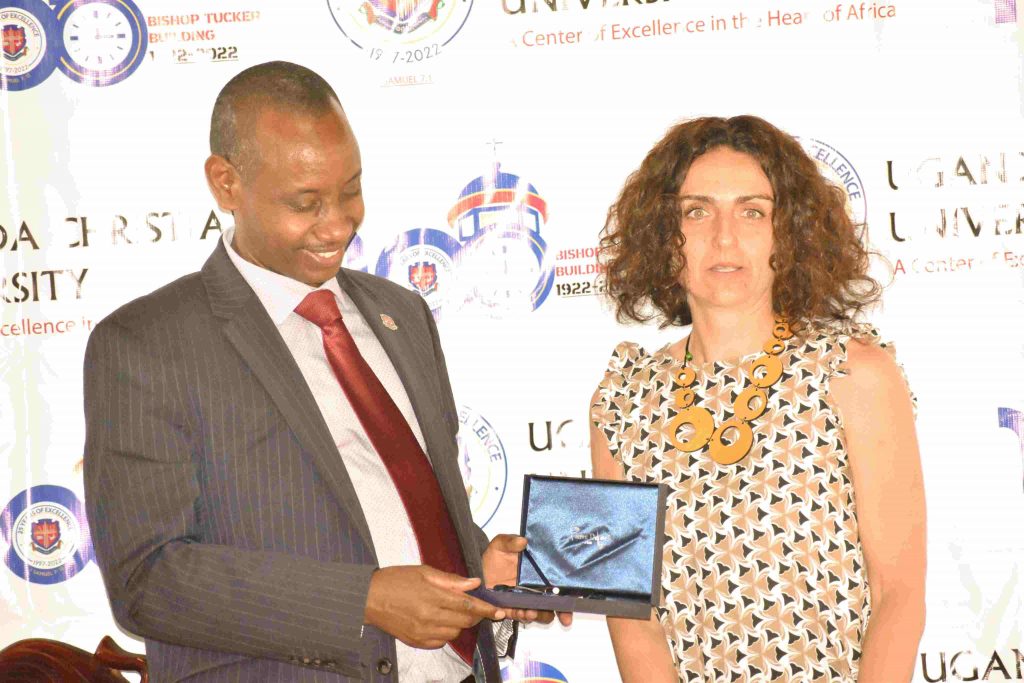By Muduku Derrick Brian
Dhatemwa Charles,28 and Sharif Bogere,17 operate at Goodwill productions, a rolex stall in Bugujju, a suburb in Mukono. For the past three years, they have been using charcoal to fry chapatis for their clients. In spite of knowing the dangers that come with cutting trees for charcoal, Dhatemwa says that it is the most viable way of making their chapattis.
“It is the cheapest method we can use. A basin of charcoal is Shs. 12,000 and I can use it for a week,” he said.
Dhatemwa says that in spite of the existence of more environmentally friendly methods of making chapati like gas, his business enterprise is going to use charcoal for a long time to come.

In a bid to encourage people such as Dhatemwa and Charles to opt for renewable energy means of operation in their enterprise, the top management at Uganda Christian University (UCU) met with a European delegation led by Prof. Katiuscia Cipri, a professor of “Renewable Energy from Geological Sources” at Sapienza University, Rome. The two universities are gearing up towards a collaboration under DALILA- a capacity building project funded by the European Union.
The partnership also involves the involvement of A Sud, a Non-Government organization based in Italy which advocates for education for positive environmental and climate changes in society.
Thirteen pioneer students will undergo training in six post graduate courses including Energy and Sustainable Development, Renewable energy, technology and decentralization of electricity, Renewable energy financing and modeling, Renewable energy enterprises Management, Energy Efficiency as well as Christian Ethics. Under graduate courses in these fields will be taught at Uganda Martyrs University, Nkozi.
Two professors under A Sud, Sara Cozzone and Annalisa Cavallini will conduct physical classes for two days at the E learning Centre at UCU in the newly introduced post graduate courses under the program.
Assoc. Prof. Aaron Mushengyezi, the Vice Chancellor of UCU says that all parties involved in the partnership should strive to ensure that the objectives of the collaboration are met and the course scaled up to accommodate more students.
“As UCU, we cherish the partnership that will ensure that innovations in areas of sustainable business and positive climate change are improved,” he said.
Mushengyezi says that more research should be done in these areas.
“We have deliberately created a department devoted to research and innovations. These innovations should be able to solve the challenges our people in society face,” he said.
He advises people in communities should derive energy from sources that are not depleted such as solar power, hydro power, geothermal energy and avoid fossil fuels like coal so that the already threatened climate change situation is improved and preserved.
According to a report Climate Change Knowledge Portal for Development Practitioners and Policy Makers, the average temperature in Uganda has increased in by 1.3 per cent since the 1960s. Notably, minimum temperatures have increased from 0.5- 1.2 per cent for this period with maximum temperatures increasingly by 0.6-0.9 Degrees Celcius.
According to a report by the United Nations, from 1880 to 2012, the average global temperature increased by 0.85 degrees Celsius. Oceans have warmed, the amounts of snow and ice have diminished and the sea level has risen. From 1901 to 2010, the global average sea level rose by 19cm as oceans expanded due to warming and ice melted.
Such statistics point to the fact that the climate situation world over is deteriorating by the day and efforts like the use of renewable are crucial in saving the existence of not only the earth but human beings as well.
Prof. Katiuscia Cipri, a professor at Sapienza University says that it is crucial to train students in the field of renewable energy.
“These students will be able to develop modules and ways to improve the way energy is used and conserved in not only Uganda but world over,” she said.
Katiuscia adds that it was an easy choice for them when it came to partnering with UCU.
“It is a university with a good background. We believe partnering with UCU will ensure that our goals of advocation for sustainable renewable energy with economic progress will be realized,” she said.
She says that she is hopeful of striking even more partnerships with the University to tackle gaps even in other sectors other than renewable energy.
Kisenyi Vincent, the Dean of the School of Business says that the school is committed to ensuring that the training of the students is affected.
“Some of the courses are the first of their kind in Uganda and we are proud to be the pioneers of such beneficial projects,”
Kisenyi adds that it is crucial to adopt renewable energy sources that have a good economical bearing on businesses.
“That is why we have a course like Renewable Energy Enterprises Management to support businesses and entrepreneurs in renewable energy,” he said.
Mutesi Joanita, the Member of Parliament for the School of Business says that this collaboration will be beneficial for the students.
“It gives us chance to create impact in the community because of the practicability of the courses,” she said.
Mutesi adds that the opportunities will also go a long way in ensuring that the environment is conserved and yet the students will be able to economically earn from their businesses.


